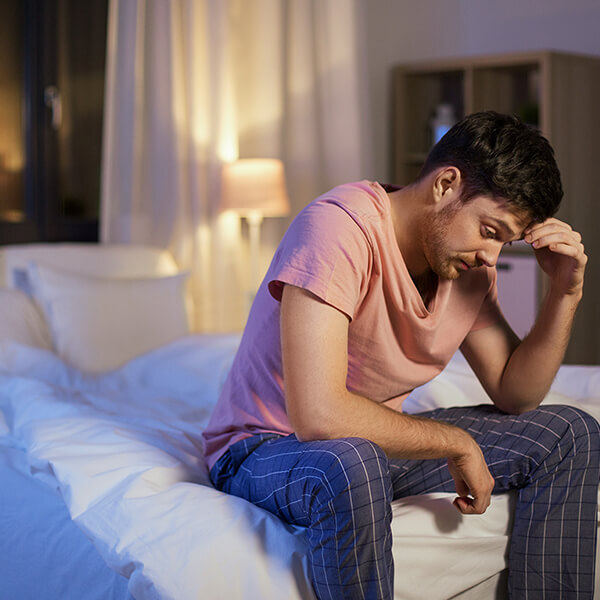
When anxiety interferes with sex, it can affect desire, arousal, or performance. This condition is known as Anxiety-Induced Sexual Dysfunction. It can happen to anyone—regardless of gender or relationship status. At DOXXES on North Freeway / Little York, we offer supportive products and expert advice to help reduce tension and improve intimacy.
What Is It?
This condition involves sexual problems caused or worsened by anxiety. It may look like:
- Superficial pain: Burning or stinging on the skin
- Deep pain: Aching inside the pelvis or belly
- Provoked pain: Discomfort triggered by touch, thought, or pressure
Why Does It Happen?
Emotional Causes:
- Stress or worry about performance
- Past trauma (emotional or sexual)
- Fear of intimacy or relationship stress
Physical Causes:
- Infections or inflammation
- Hormonal changes (low estrogen or testosterone)
- Pelvic floor muscle problems
- Physical conditions like phimosis or labial fusion
Often, mental and physical causes combine.
Real-Life Examples & Triggers
Common situations:
- A woman feels pain from muscle tension during sex
- A man loses his erection due to racing thoughts
- A couple avoids intimacy out of fear
- Someone feels tightness during arousal but doesn’t know why
How to identify triggers:
- Keep a journal of your mood and sexual experiences
- Notice what helps or worsens symptoms
- Make small changes (lubricants, timing, or positions) to test what brings comfort
Who It Affects
This condition can affect anyone.
- Women: May feel pain, avoid sex, or fear penetration
- Men: Might face ED, early ejaculation, or low desire
- Nonbinary and trans individuals: May struggle with dysphoria or discomfort related to identity and intimacy
How a Sex Therapist Can Help
A sex therapist can:
- Explore your emotional and sexual history
- Identify root causes (like “painful abdomen after intercourse”)
- Screen for anxiety, PTSD, or other issues
- Teach coping and communication skills
How to Cope & Find Relief
Emotional support:
- Talk therapy: CBT, sex therapy, or trauma-focused sessions
- Breathing techniques: Help calm the mind and body
- Mindfulness: Encourages focus on the moment instead of anxious thoughts
Physical approaches:
- Medications: Some people benefit from anxiety or mood medications
- Lubricants or creams: Reduce pain and improve comfort
- Healthy habits: Better sleep, movement, and nutrition help balance mood and hormones

How DOXXES Can Help
We offer products to support your journey:
- Water-based lubricants for less friction
- Pelvic floor trainers to ease or strengthen muscles
- Gentle vibrators to improve comfort and circulation
- Prostate massagers for deeper relaxation and relief
Each product comes with safety and care tips. They work best alongside therapy or self-care.
Talking About It with Your Partner
- Use “I” statements like “I get nervous when things feel uncomfortable”
- Talk in a calm moment, not during sex
- Read resources together
- Discuss triggers openly
- Ask for help early—don’t wait until stress builds
Visit DOXXES – North Freeway / Little York
Come by for private, friendly support. Our team can answer questions, explain products, and guide you through options to improve comfort and confidence.
Conclusion
Anxiety can cause sexual problems—but you’re not alone, and help is available. With the right care, honest communication, and supportive tools, you can enjoy a healthier and more connected sex life. Visit DOXXES on North Freeway / Little York to start your journey toward relief.
FAQs
- How does anxiety affect sexual function?
It can block arousal, reduce focus, or cause muscle tension and pain. - Can I get care at North Freeway / Little York?
Yes. We offer products, guidance, and mental health support for sexual wellness. - What are signs of anxiety-related dysfunction?
Common signs include ED, early ejaculation, pain, fear of sex, or low desire. - Is performance anxiety treatable?
Yes. Therapy, breathing techniques, and sometimes medication can help a lot. - Can anxiety cause pain during sex?
Yes—especially when pelvic muscles tense up without you realizing it. - Do medications help?
They can. Some reduce anxiety and improve focus. Always ask your provider. - Can therapy alone make things better?
Yes. CBT and sex therapy work well for many people. - Is this condition common?
Very. It’s one of the top causes of sexual difficulties not linked to illness. - Do breathing techniques help in the moment?
Yes. They relax your body and calm your thoughts, which supports arousal. - Can I recover fully with help?
Absolutely. With the right care plan, most people return to a healthy sex life.
